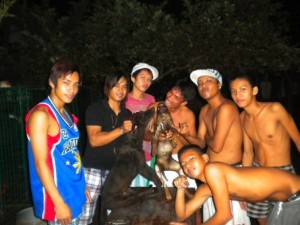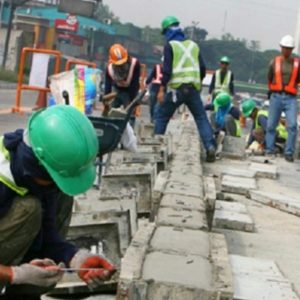Continuing to send Filipino workers overseas to seek and sustain employment is a serious misallocation of human capital. Much the same way as wanton mining in the Philippine countryside took a huge toll on the environment and landscape, exporting people leaves deep scars in the Philipines’ social fabric.
And so, here is why the OFW issue, the mining thing, and the much-misrepresented “war on drugs” are important pieces in the puzzle of sustaining the stellar economic growth the Philippines is currently in the midst of.
There is an emerging coherent backdrop to the stated intent of the government of Philippine President Rodrigo Duterte to invest heavily in infrastructure development to sustain economic growth. The Financial Times reports that the Duterte government will spend up to $160 billion to make good on that plan. The need to uplift the Philippines’ decrepit infrastructure is a no-brainer. Successive administrations have been measured on how much visible infrastructural wonders they have respectively delivered and left as lasting legacies.
| SUPPORT INDEPENDENT SOCIAL COMMENTARY! Subscribe to our Substack community GRP Insider to receive by email our in-depth free weekly newsletter. Opt into a paid subscription and you'll get premium insider briefs and insights from us. Subscribe to our Substack newsletter, GRP Insider! Learn more |

Weak social foundation: Filipino youths slaughtering dogs for nibblies
At present, there already is a high-profile initiative to secure the Philippines’ landscape and environment from any further degradation that, for decades, had been wrought by mining — a programme being executed with zeal by Environment Secretary Gina Lopez.
The other one, Duterte’s famous (or, rather, infamous) “war on drugs” seeks to eradicate a social cancer that has, for so long, been left to fester and not only terrorise ordinary law-abiding Filipinos but degrade the core of the nation’s human capital base — its youth, its unemployed, and the idle offspring of its wealthy classes. As the cliché goes, in a society’s youth lies its future. Add to that its unemployed who have much to offer given the opportunity. And of those born with a silver spoon in their mouths who spend their days — and their inheritances — doing drugs? That’s capital that could have been invested but is, instead, being lost to the crime syndicates.
This brings us to the OFWs whose remittances account for up to 10% of the Philippine economy. Unfortunately, the damage left by OFW export is the social equivalent of the damage left by mining and raw export of minerals. For both, the scars are permanent. An entire generation of Filipino kids grow up under sub-optimal conditions — remotely-parented by an entire generation of OFW adults. While the tangible cash contribution to the economy of OFWs is much-celebrated, the cost of this windfall is consistently obscured by layers of ill-thought-out rationalisation.
Back in 2008, then United Nations International Children’s Fund (UNICEF) deputy country representative Colin Davis stressed the “social cost of migration” and how its “painful effects are beyond measure and must be analyzed critically at the policy level.” Perhaps Duterte could be regarded as the first Filipino president who made an intent to reverse the tide of OFWs quite explicit. In a speech delivered to the Filipino community in Tokyo during an official visit there, Duterte vowed that “the next generation of Filipinos will not be overseas workers”. This represents a decisive departure from previous governments’ reliance on the low-hanging fruit that is OFW remittances to sustain a significant chunk of the national economy.

Expansion of the domestic capital base is key to sustainable economic growth.
As far as we have so far observed, the Duterte government is focusing on the hard problem of building that foundation and investing on the infrastructure on top of that foundation. This has come at the cost of sustained attack from entrenched oligarchic interests — mining firms, retailers and mall operators, trash entertainment producers, casino operators, telecoms firms, and, yes, the drug syndicates; big business interests that feed off easy OFW cash. Because these big firms exert vast thought leadership (thanks to their mega-million-funded brands, media presence and cheesy viral video advertisements), the “disente” crowd with their access to expensive media consumption devices are easy prey to clever marketing and its payload of flawed “thought leadership”.
As the saying goes…
If you are not pissing somebody off, you are probably not doing anything important.
* * *
Epilogue:
It is quite evident that the so-called “disente” crowd is pissed off with the way President Duterte is going about his business. The best perspective to take when regarding this quaint annoyance is to see whether they could come up with not just better ways of doing things but different ways of doings things. After all, insanity is characterised by an expectation that different results will be seen whilst doing the same things over and over again.
benign0 is the Webmaster of GetRealPhilippines.com.
Graft and corruption; incompetence of our leaders, also are factors that need to be minimized. The mindset of Filipinos needs to be modified and evolved to a better way. Their attitudes, characters, etc… are bad…
I believe that unless, we start with industrialization. We will never stop the OFWs and the draining of the brains in the Philippines.
The next generation should be encouraged to pursue the fields of Science and Technology…
Population control is a must. The Churches must not mind any functions in the government !
a recent doco on Channel News Asia http://www.channelnewsasia.com/news/singapore/working-hard-to-create-a-mini-singapore-in-africa/3511818.html showed how a small African nation of 12 million shattered by the genocide of 1994 has been reinventing itself since 2008.
It has turned to Singapore to apply ideas from the Singapore Development Board in areas of education, public housing and technology to leapfrog ahead and beyond its basic agricultural status.
Rwanda has no need to export its people but rather imports ideas successfully.
Rwanda is one of those places on my bucket list (hopefully not literally). I think the genocide must have made them look at themselves and think: what have we become?
Is that what has to happen to Filipinos before they finally stop thumping their chests and shouting “Pinoy Pride”, accept that they have failed miserably, and look outside of their own empty heads for better ideas, like the Rwandans? I hope not.
as long as terrorism is still in the Philippines, no foreign investors will come. iron hand is the way to exterminate terrorism.
for wally sombrero there’s only two questions to ask: 1. where did you get the money? or 2. who gave you the money? prove is done. if he can’t answer that, arrest him right away.
BeetleFarmer: investors don’t come to the Philippines because of Filipinos. Terrorists are a fairly minor concern: there might be a couple of thousand terrorists, but there are 100 million Filipinos, most of whom will be intent on either (a) fleecing the investor or (b) making sure his business fails. Or both.
The greatest shortcoming of the Failippines is their inability to understand the exponential function.
One main problem too, both on the anti and pro Duterte gov’t political perspectives is their naiveté. Some miscalculations are not what they appear to be. It’s a game. It’s part of the unconventional methods that Duterte deploys. One would have to be a total fool to strictly go by the book while your enemies inherently have the advantage of not playing by the rules. Again, it’s just common sense.
Not a bad article, whereas I do struggle to find any common ground with what seems to be a trend of supporting articles for government actions which are manifestly wrong at best and downright criminal in most legal assessments I think this warrants a reasonable discussion. Not many rational people could argue that these as longer term goals are admirable and sensible. The truth is that any foundation needs to be rigorously considered and debated and simply getting started without planning things properly is a sure road to ruin. It’s interesting to see the current volte face in the war on drugs due to exposure of what we all knew… the institutions were ill placed to implement anything but chaos, murder and the criminality which the goal was to eliminate . Don’t get me wrong, drugs are bad for any society but if you want to address an issue you don’t treat the symptoms you get to the root cause of the problem. Isn’t that simply corruption, inequality and lack of access to opportunities? So let’s try and build the structure without planning the right foundation… precisely what has happened. As identified many times in this blog, people’s inability to think long term and set a course and follow through is a big inhibitor in the development of this country. My fear is that the longer term goals may be correct but the focus on day to day instant action completely undermines the chances of longer term success.
The same with infrastructure goals, the foundation should be clean government institutions with world class professionals experienced in planning and developing what is needed. Wouldn’t it be absurd that in the rush to get a quick ill thought out solution the foundational issues weren’t resolved and it devolved into a farce as usual? Would that be any different to the status quo of the past administrations? No it would get exactly the same result, with the tragic casualty that a common social outrage against the stench that is the system here is undermined and an opportunity of many decades to bring about real, planned and achievable improvements falls down in a vortex of disillusionment as usual. Despite the best intentions I beg to differ that we will see any success.
@Vegemite, thanks. Indeed, it takes a bit of imagination to find a structure to the problem you are trying to solve and applying a structurally-sound solution to it. A lot of the country’s problems require an engineered solution rather than a sloganeered one. For that matter, systematic problem solving is what has long been evidently lacking in our setting…
Sorry, not any rational person could argue that these goals are NOT admirable or sensible…
there’s a constitutional crisis in the senate. the yellows are trying hard to twist it in their favor.